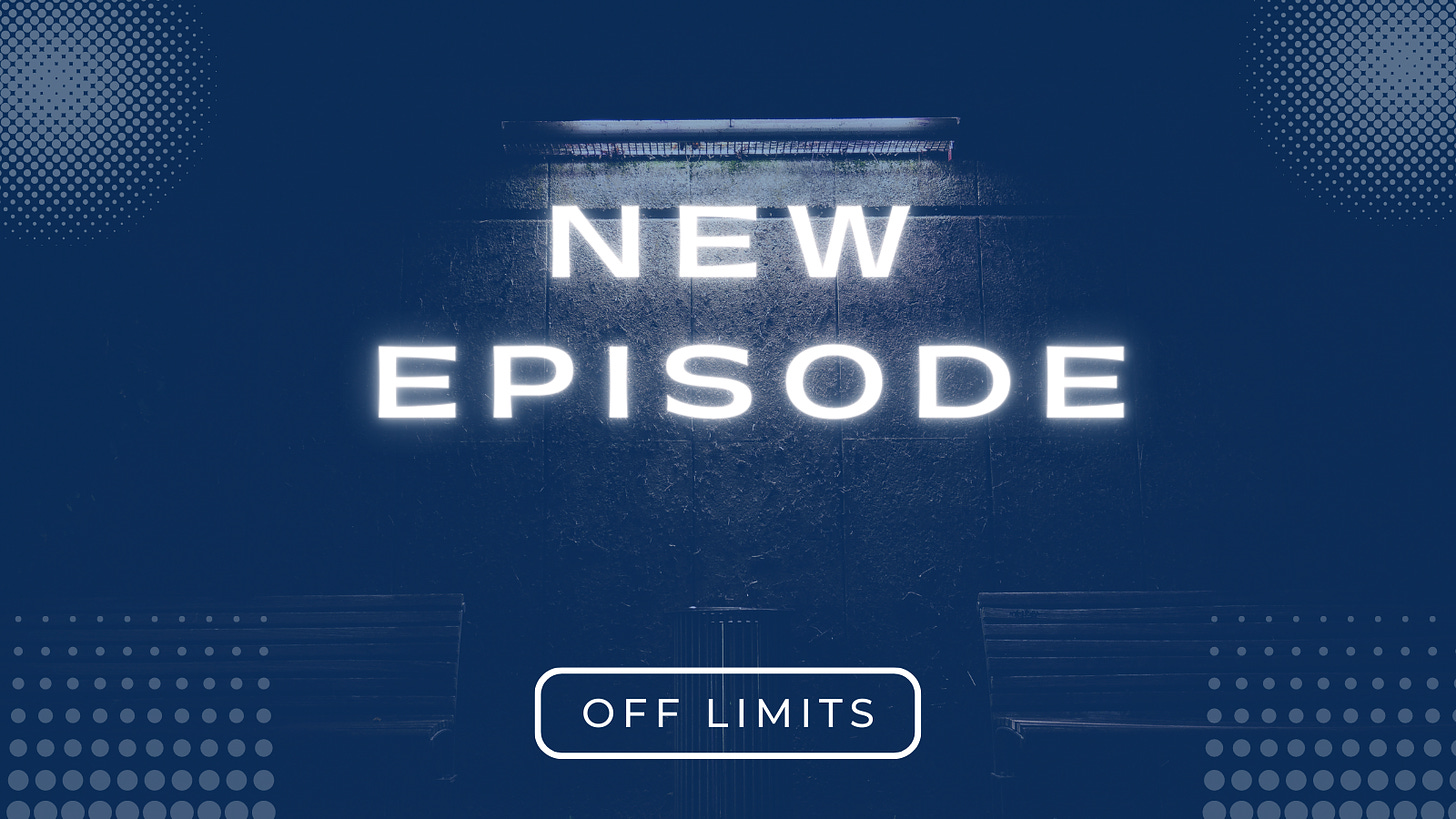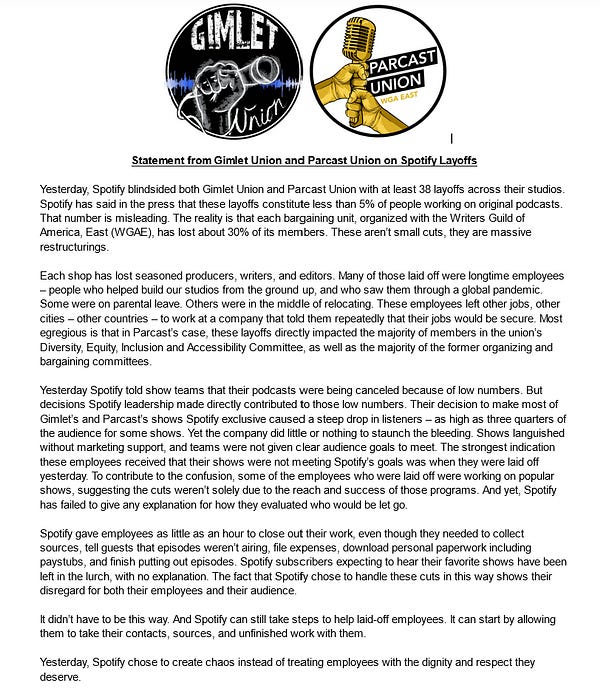Where Next for Platform Exclusive Podcasts?
are the numbers adding up for single platform shows?
In May 2020, Spotify shook the podcasting world when it announced it had signed the hugely popular YouTube show, The Joe Rogan Experience, to an exclusive deal on Spotify.
The deal meant Rogan’s show would only be available on Spotify, and his back catalogue of videos on YouTube would be removed.
The amount paid was said to be $100 million at the time, though it turned out that was only half the actual amount of $200 million the streaming giant paid for Rogan’s services.
While the amount was mind-boggling, it was only a part of Spotify’s bigger acquisition push to lead the podcasting/audio-on-demand space. It’s almost four years since Spotify bought Gimlet Media, Anchor, and Parcast in early 2019, followed up by The Ringer in 2020, and then Megaphone.
Add in the recent purchases of analytics companies Podsights and Chartable, as well as platform safety company Kinzen, and Spotify has spent well north of $1 billion since that first acquisition when taking into account the deals for their platform-exclusive shows.
The reasoning is simple: as per Spotify’s Chief Content Officer Dawn Ostroff, speaking in 2020,
“We are still in the early chapters of the streaming audio industry story, but it is absolutely clear that the potential is significant. Our mission… to accelerate smarter podcast monetization for advertisers and podcast publishers powered by a scaled audience and state-of-the-art technology.”
With Spotify’s Streaming Ad Insertion technology offering advertisers highly targeted audiences, as well as its paid subscription service where Spotify will take 5% of revenue from podcasters who use this feature, Ostroff and the executive team at Spotify see a clear path to revenue and profit for the company.
This is where the exclusive deals are set to play a part - if fans of Joe Rogan and other exclusive shows can only get their fix on Spotify, the hope/belief is that the majority of these fans will follow to Spotify, opening up an even bigger audience to Spotify’s ad partners.
At least, that’s the goal.
Is the Exclusive Sheen Wearing Off?
If you take a look at Spotify Advertising’s Original & Exclusive Podcasts page, the names are impressive and read like a who’s who of some of the most well-known shows in the space.
Reply All, Unlocking Us with Brene Brown, Dictators, Renegades, The Michelle Obama Podcast, and Call Her Daddy are just some of the shows on Spotify’s roster, many of which received millions of dollars to be there.
Given the highly engaged and loyal audiences of many of these shows, it’s a fair assumption to believe that the audience will follow, regardless of platform. But questions have continued to be asked as to whether this is the case.
The Obamas media company, for example, ended their exclusive deal with Spotify, with sources close to the company citing frustration at the limited reach the exclusivity caused.
Hugely popular comedy-horror podcast Last Podcast on the Left announced it would no longer be a Spotify exclusive, and was looking forward to being a multi-platform show again.
Joe Budden, one of Spotify’s earliest exclusives, also ended his exclusive contract due to financial reasons.
These examples, and others like them, raise the question of whether a large incentive to be exclusive pays off in the longer term, either from an audience standpoint or a financial one (perhaps even both).
Just this week, the question around audience numbers came up with the news that Spotify was letting go employees from the Gimlet Media and Parcast Network teams.
The joint statement by the Gimlet Union and Parcast Union shares these layoffs come as a result of Spotify cancelling podcasts that had low numbers, which the unions say came about due to these shows being Spotify exclusives, which led to a sharp drop in listeners - as much as 75% in some cases.
For advertisers, that number would represent a huge drop in potential revenue, which could see them abandon, or at least reduce, their advertising with Spotify (or any platform that shows such a drastic reduction in audience).
If the 75% number is correct, it’d explain why some of the bigger shows on Spotify looked to end the exclusive contract, and return to multi-platform availability.
Spotify still has more than enough exclusives, and no doubt more shows will be brought into the Spotify-only hub. With its goal to be the number one audio-on-demand destination for listeners, it’s no surprise that Spotify would want to make their platform the only place to get the most popular shows.
Will the TV Streaming Wars Provide a Preview at the Audio Wars Outcome?
If you look at the video streaming wars, you can see where Spotify is coming from. Before Spotify’s entry into the space, Apple Podcasts was the lead platform, but they didn’t offer exclusives. If you wanted to listen to your favourite show, you could do that on Apple, or Stitcher, or any of the various apps around.
While great for the open podcasting ecosystem, it also meant there didn’t need to be loyalty towards any of the apps when it came to shows - instead, features of the app decided what listeners used, as opposed to content.
Compare that to TV streaming/video-on-demand. For the longest time, Netflix ruled the roost, and while they did have some exclusives, you could also watch shows and movies elsewhere.
Then up stepped Disney+. While there are other streaming platforms like Apple TV, Hulu, Prime TV, etc, Disney+ has a massive advantage in that it owns the rights to some of the biggest franchises around.
Want to watch Star Wars content? Only on Disney+. Want to watch the Marvel Universe? Only on Disney+. Want to watch classic Disney movies? Yep, you see where this is going.
Because of this, Disney+ has been able to grow its subscriber base to 221 million, despite only launching in 2019. This puts it ahead of Netflix, which has 220.7 million subscribers, a drop of one million from its previously-reported quarter.
Netflix has been struggling for a while, with the cost of investment for its exclusive shows and licenses not being met with the expected growth in subscriber numbers to watch this content.
Transfer this battle to podcasting, with Apple being Netflix and Spotify taking the role of Disney+. Obviously there are some key differences, with Apple looking like they don’t feel the need to invest in exclusives the way Spotify is. Instead, it’s continuing to add to the partners it brings to its subscription options, with BBC Studios and Slate offering additional content for Apple Podcasts Subscription users.
Spotify, like Disney+, is looking to make the question of where you listen to your favourite show an easy one to answer. Much like a Star Wars fan like me buys a Disney+ subscription from day one, if you can only get the full content of your favourite show by paying for a premium Spotify account, that’s a cost you’re probably going to take.
There’s one key difference in the audio-on-demand battle, though, and that’s the creators.
While loyal listeners will happily pay to get their favourite content, that may not be enough for the creators of that content. If, like the Obamas, frustration at a limited audience sees you end even the most lucrative of contracts, that could yet play a big part in how future platform exclusivity plays out.
It’s going to be an interesting few years ahead.






